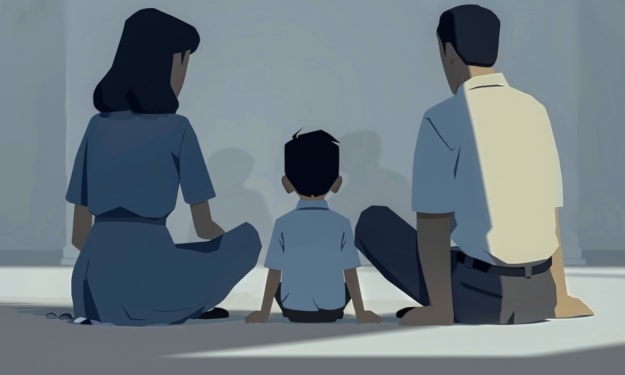Hoping to not be too weird
The first time my daughter asked me to chaperone a field trip, she gave me clear instructions: don’t be weird.

“Bring your raincoat,” I said to Jade.
My daughter was finishing up her morning routine: brushing her teeth, pulling her new braids back into a ponytail and laying her edges. The familiar smell of coconut oil meant she was almost ready to go. I heard the squeaky door on the shoe closet open and looked over. She reached past her Nikes to grab her Adidas, then remembered the field trip and pulled on her boots instead.
Today started especially rainy. A dense petrichor filled the room as we opened the front door, quickly overtaking the pleasant coconut smell. It was going to be a very wet, muddy day. I was hoping those black leather boots were going to keep her feet dry.
Raincoats are not cool in Seattle- they’re a sure sign that you’re not from here and only just better than an umbrella, something a local would never use. Hoodies are okay, but not ones made out of nylon or rayon or polyester blends. The sound those fabrics make as your arms glide effortlessly past your sides is like a not-so-subtle reminder that you do not belong. Still, I knew we’d be outside all day, and I also knew Jade wouldn’t want her braids to get messed up. Protecting the hair won out and the purple rain jacket went on.
The first time Jade had asked me to chaperone a field trip, she gave me clear instructions: don’t be weird. Because I’m one of those dads, she knew it was important to lay down a few additional rules:
1) Be friendly, but no funny stories about when she was a baby.
2) Dad jokes are strictly off limits.
3) I may not pick her up at any point unless asked.
4) The field trip is not about me.
I felt confident based on her feedback from the last field trip, after which she simply stated: “thanks for not being too weird.” Still, it felt a bit like walking a tightrope, and I was starting off a bit unbalanced, having insisted on the raincoat.
Earlier that morning, I had gotten up to make breakfast for her and the boys, as I do every day. Jade likes a toasted English Muffin with a fried egg where the yolk is just soft enough to run, but hard enough to not drip all over her hands and nails. Noah always has oatmeal and Jaylen has eggs with toast. My meds are to be taken with a meal of at least 450 calories, so I make myself two eggs and toast with a slice of turkey. I wash down my antiretrovirals with coffee and a chaser of probiotics and vitamins with a protein shake.
I worried a bit about the cold weather and the dozens of kids who awaited me, with their inevitable sniffles and coughs. Having convinced Jade to wear a raincoat, I felt okay wearing mine. Not weird. I practiced fist bumps instead of high fives, because it felt a bit safer, like I was less likely to get a hand full of snot or germs that way. I was feeling good, though, and my immune system was strong.
When I first got my HIV diagnosis, Jade was just two years old. It was unexpected; I had survived years of animated urban gay life before marriage and kids, and managed to avoid the plague that had killed so many of my contemporaries. I was so careful at this point in my life, so calculated about my risks.
I was overwhelmed by feelings of shame and guilt, and allowed taking care of the person whose HIV had been shared with me to distract me. Late night phone calls overflowing with his emotions and tears were an easy way for me to avoid my own feelings, and also allowed me to shift to an easy default for me: being helpful. Having buried so many friends with HIV and AIDS, I was not clear how my life should continue, but I didn’t want to think about it. I acted as if my illness was invisible, allowed the rainy grey skies of Seattle to soak deep into my bones like a local, convinced that the way to still fit in was to pretend like I was unaffected.
I hoped that I would somehow be unaffected.
I worried about getting sick, but I worried more about my kids finding out I was sick. I worried about dying, but also convinced myself that confronting my sickness by going on meds was too risky. I didn’t want my kids to find my pills and worry about me. I didn’t want them to think I was going to die.
Hope is fickle, though, and my body called my bluff, said it couldn’t fight on its own anymore. It forced me to make some hard choices and start dealing with my illness, to accept that I couldn’t pretend everything was okay, even if my illness was not obvious to others.
Which doesn’t mean I like the smell or taste of the meds, even years later, any more than I like the smell or feel of nylon rain jackets. And it doesn’t mean that I like the sound of my hand clicking open the top of my bottle of antiretrovirals, any more than I like the sound of my arms gliding effortlessly against my waist in my raincoat. And it doesn’t mean that dealing with my illness makes me feel any less like an outsider than how I feel walking around in a raincoat on a wet Seattle morning.
But it does mean that I can focus my energies, at least for now, on a different hope: to not be weird, or at least not too weird for my daughter to spend time with me. Because even though I’m that kind of sick, I’m also still that kind of dad. And not being weird still takes a lot of effort.
About the Creator
F Cade Swanson
Queer dad from Virginia now living and writing in the Pacific Northwest. Dad poems, sad poems, stories about life. Read more at fcadeswanson.com
Enjoyed the story? Support the Creator.
Subscribe for free to receive all their stories in your feed. You could also pledge your support or give them a one-off tip, letting them know you appreciate their work.








Comments (1)
This was a lovely story. Being a parent myself, I also find it hard to have that balance of not interfering, but also being present and available.